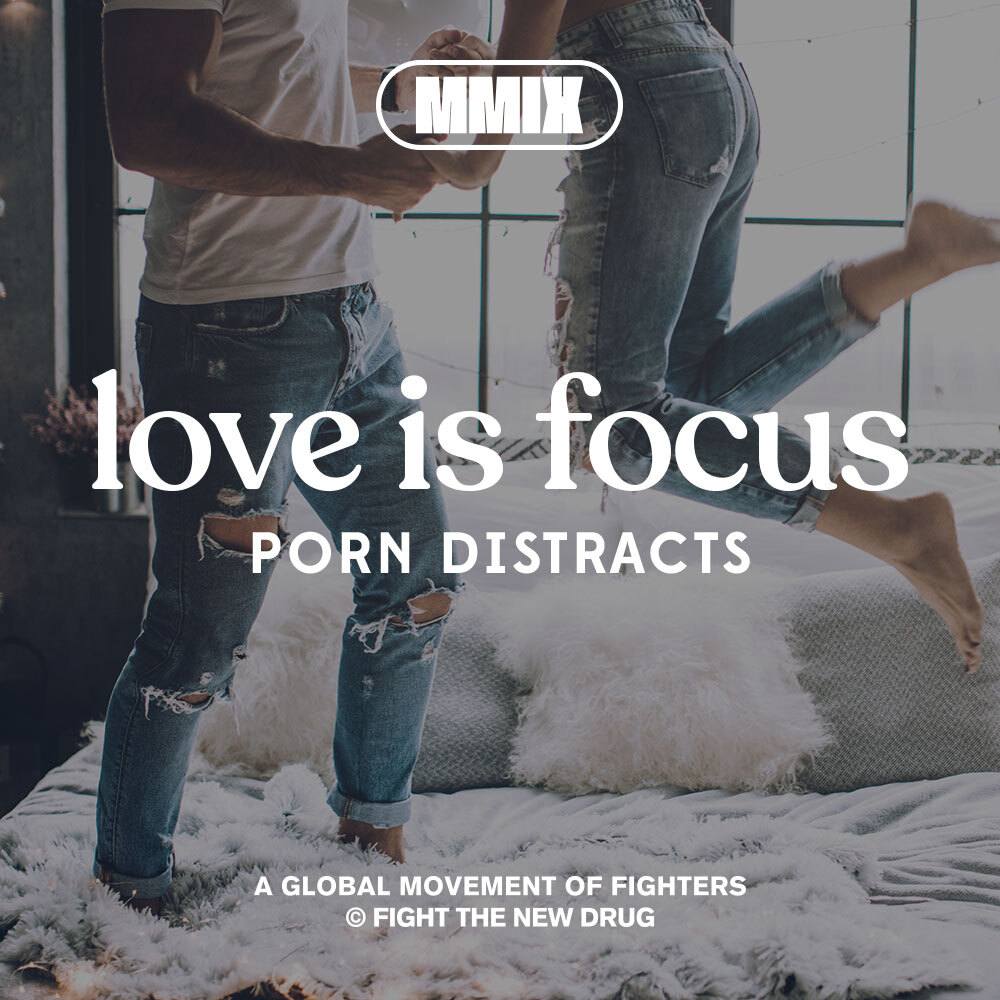Fight the New Drug is a non-religious and non-legislative awareness and education organization that provides access to resources that are helpful to those who need support. Including links and discussions about legislative matters does not constitute an endorsement by Fight the New Drug.
Let’s talk about love for a minute.
Think about the people who have had the greatest impact on your life. Think of your parental figures, an awesome teacher, or your best friend. If you have a significant other, picture them and their happiness. Regardless of who that person is in your life, think of how much you cherish and love all that they are and what they bring to your life. Love is something that unifies us and gives us life.
Now, let’s compare that to porn.
Porn is graphic and explicit, and shows the human body as a sex object to be used, exploited, and discarded. It’s a twisted portrayal of real connections, a counterfeit, a lie to consumers. It shows transactional sex that’s empty of any true passion or love or intimacy, infused with aggression and performance exaggeration. In the end, the consumer is left as a spectator sport of scripted sex and fake orgasms.
Here at Fight the New Drug, we’re all about fighting for real love and fighting for true passions that make life even better. We want you to love, to be loved, and to love life. Here are three ways porn can harm real love, and infect healthy relationships.
1. Porn harms consumers’ understanding of healthy sex
As humans, we are wired to sexually connect with another person and express deep feelings through physicality. We are a pro-sex and a sex-positive organization because we view sex as something that’s natural and normal, to be desired by everyone. We see sex as an extension of expression and love, and an awesome part of committed, loving relationships. We think it should be freely discussed without awkwardness or shame attached. We value consensual relationships, and consider sex as a healthy part of life that consenting partners should enjoy.
The sex portrayed in mainstream porn today is not healthy, plain and simple. If you don’t believe us, we compiled a list of ten of the main differences between healthy sex and the sex shown in porn.
Related: How Porn Is More Violently Dehumanizing And Sexually Objectifying To Women Than Ever
Healthy, positive sex involves loving and knowing all of each other and celebrating the fullness of intimacy—not just the physical part.
In contrast, porn does not promote sex as a multi-faceted act of love and closeness. It ignores the emotional and psychological parts of true sexual intimacy, instead of teaching consumers (often as kids’ earliest teacher on the topic of sex) that sex is mainly about performance.
But not only that—porn teaches consumers not to value consent in their relationships. Even if performers consent off-camera to performing violent and degrading acts, often, that consent does not play a part in the scene depicted. Consider how these scenarios sell the idea that it’s important to maximize your own pleasure over what’s happening to the other person. Not healthy, right? Being sex-positive means valuing consent and both parties’ experiences, simple as that.
Also, porn fetishizes the bodies and sexualities of those in the LGBTQ+ community, and that’s not okay. For an industry that often markets itself as being LGBTQ-friendly, the porn industry endlessly exploits and fetishizes LGBTQ+ relationships and sex.
2. Porn leaves consumers lonely
When people consume porn, it can have some serious mental costs.
From body-image issues to depression and anxiety, the list of porn’s side effects isn’t pretty. For many people, porn becomes an escape from having to deal with problems, but it only leaves them feeling hollow, empty, and without purpose afterward. Plus, the shame that invariably accompanies watching porn leads to an increased strain on relationships and self-esteem, resulting in loved ones and friends pushed to the side as porn takes center stage.
Research suggests that depression, anxiety, and loneliness are fueled by porn. Instead of escaping these real-life issues by watching porn, watching more of it can fuel more sadness, more emptiness, more darkness. Sometimes, this leads people back to porn, continuing a vicious cycle of relying on porn as an escape and it only makes the problem of loneliness worse. Choose love and investing in relationships over something that can make you lonelier.
3. Porn hurts your partner
Long-term studies paint a very different picture than what you might be hearing from pro-porn advocates. The preponderance of evidence from a dozen or more in-depth, longer-term studies consistently show porn consumption lowering relationship satisfaction, emotional closeness, and sexual satisfaction. [1]
Let’s take a look at some more info.
• Two highly respected pornography researchers from the University of Alabama, Jennings Bryant and Dolf Zillmann, studied the effects of porn and media for more than 30 years. Their findings conclude that consuming pornography can make an individual less satisfied with their partner’s physical appearance, sexual performance, sexual curiosity, and affection. What’s more, some individuals felt not just dissatisfied, but critical, of these aspects of their partner.
• A 2012 study by Amanda Maddox and her team concluded that individuals who never viewed sexually-explicit material reported higher relationship quality (on every measure) compared with those who viewed the same explicit material on their own. [2]
Related: Can Porn Improve An Intimate Relationship?
• In one of the few studies to follow married couples and their pornography consumption for several years, researchers found that porn did, in fact, harm relationship quality and satisfaction. The researchers concluded:
“In general, married persons who more frequently viewed pornography in 2006 reported significantly lower levels of marital quality in 2012… Pornography’s effect was not simply a proxy for dissatisfaction with sex life or marital decision-making in 2006. In terms of substantive influence, the frequency of pornography use in 2006 was the second strongest predictor of marital quality in 2012.”
• A study published in 2017 examined the impact of couples where one partner consumes more porn than the other—which is a pretty common pattern. The researchers concluded that “greater discrepancies between partners in pornography use were related to less relationship satisfaction, less stability, less positive communication, and more relational aggression.” [3]
Related: How It Feels To Finally Be In A Relationship With Someone Who Doesn’t Watch Porn
Study after study has shown that contrary to popular belief, porn itself is bad news for long-term relationships. Not an unsupportive and porn-disapproving partner, but the porn itself. The majority of research reflects that porn negatively affects satisfaction within the relationship and ultimately can lead a person to withdraw from a loved one.
As porn becomes more normalized, we want to be a source of information pointing out that porn is not harmless. This isn’t a moral argument. This comes down to you and your personal relationships, and the opportunity to make an informed decision about what will make them indefinitely thrive.
Why we fight
Real love is sexy, not fake pixels on a screen like porn.
Love is something that brings meaning and purpose to life, it’s something that we are all after. And if you value real love and healthy relationships, consider how porn doesn’t help either of those things thrive.
Porn is marketed as empowering, but it is really one of the most sex-negative things out there. Love is worth fighting for, and porn won’t contribute to that in the long-run.
Need help?
For those reading this who feel they are struggling with pornography, you are not alone. Check out Fortify, a science-based recovery platform dedicated to helping you find lasting freedom from pornography. Fortify now offers a free experience for both teens and adults. Connect with others, learn about your unwanted porn habit, and track your recovery journey. There is hope—sign up today.
Fight the New Drug may receive financial support from purchases made using affiliate links.

Citations
[1] Wilson, G. (2013). Studies Linking Porn Use Or Porn/Sex Addiction To Sexual Dysfunctions, Lower Arousal, And Lower Sexual & Relationship Satisfaction; Retrieved From https://www.yourbrainonporn.com/studies-reported-relationships-between-porn-use-or-porn-addictionsex-addiction-and-sexual
[2] Maddox, A. M., Rhoades, G. K., & Markman, H. J. (2011). Viewing Sexually-Explicit Materials Alone or Together: Associations with Relationship Quality. Archives of Sexual Behavior, 40(2), 441–448. http://doi.org/10.1007/s10508-009-9585-4
[3] Willoughby, B. J., Carroll, J. S., Busby, D. M., & Brown, C. (2016). Differences in pornography use among couples: Associations with satisfaction, stability, and relationship processes. Archives of Sexual Behavior, 45, 145-148, doi: 10.1007/s10508-015-0562-9
Your Support Matters Now More Than Ever
Most kids today are exposed to porn by the age of 12. By the time they’re teenagers, 75% of boys and 70% of girls have already viewed itRobb, M.B., & Mann, S. (2023). Teens and pornography. San Francisco, CA: Common Sense.Copy —often before they’ve had a single healthy conversation about it.
Even more concerning: over half of boys and nearly 40% of girls believe porn is a realistic depiction of sexMartellozzo, E., Monaghan, A., Adler, J. R., Davidson, J., Leyva, R., & Horvath, M. A. H. (2016). “I wasn’t sure it was normal to watch it”: A quantitative and qualitative examination of the impact of online pornography on the values, attitudes, beliefs and behaviours of children and young people. Middlesex University, NSPCC, & Office of the Children’s Commissioner.Copy . And among teens who have seen porn, more than 79% of teens use it to learn how to have sexRobb, M.B., & Mann, S. (2023). Teens and pornography. San Francisco, CA: Common Sense.Copy . That means millions of young people are getting sex ed from violent, degrading content, which becomes their baseline understanding of intimacy. Out of the most popular porn, 33%-88% of videos contain physical aggression and nonconsensual violence-related themesFritz, N., Malic, V., Paul, B., & Zhou, Y. (2020). A descriptive analysis of the types, targets, and relative frequency of aggression in mainstream pornography. Archives of Sexual Behavior, 49(8), 3041-3053. doi:10.1007/s10508-020-01773-0Copy Bridges et al., 2010, “Aggression and Sexual Behavior in Best-Selling Pornography Videos: A Content Analysis,” Violence Against Women.Copy .
From increasing rates of loneliness, depression, and self-doubt, to distorted views of sex, reduced relationship satisfaction, and riskier sexual behavior among teens, porn is impacting individuals, relationships, and society worldwideFight the New Drug. (2024, May). Get the Facts (Series of web articles). Fight the New Drug.Copy .
This is why Fight the New Drug exists—but we can’t do it without you.
Your donation directly fuels the creation of new educational resources, including our awareness-raising videos, podcasts, research-driven articles, engaging school presentations, and digital tools that reach youth where they are: online and in school. It equips individuals, parents, educators, and youth with trustworthy resources to start the conversation.
Will you join us? We’re grateful for whatever you can give—but a recurring donation makes the biggest difference. Every dollar directly supports our vital work, and every individual we reach decreases sexual exploitation. Let’s fight for real love:




